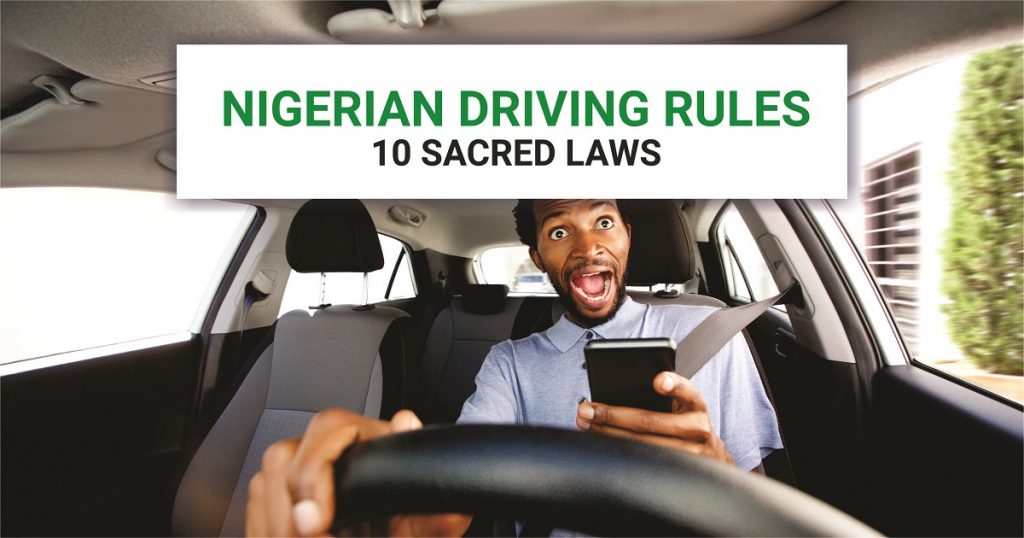Breaking driving laws could be an expensive error and will cost you your time, money or even your life. It could cost you your time and money if you are caught by the safety marshal. However, in a reckless situation, your life and the lives of others in the car be extinguished in one wrong move.
You might break Nigerian traffic rules and get away with them but others aren’t as lucky. Regardless of the weight of the consequences, ignorance of the law is not an excuse. Below are 10 Nigerian driving rules that can land you in trouble:
1. Don’t Use Your Mobile Phone While Driving

This is a driving rule that many drivers flout. It has contributed a great deal to many road accidents and traffic marshals frown greatly at it. A study recently revealed that cell phone use while driving leads to 1.6 million road accidents each year. It might stun you to know that about 390,000 injuries occur annually from car crashes caused by drivers who text while driving.
2. Always Use Your Seat Belt
This rule is for your safety as a driver as well as your passengers yet, many drivers break this law with impunity. Failure to use a seat-belt is bound to land you in trouble with Nigerian traffic marshals.
3. Lights and Reflectors Must be in Good Condition

Some drivers have cars that have faulty lights and reflectors. Nigerian driving rules make it mandatory for your vehicle to be roadworthy and this includes having signs that tell the car behind you what your next turn is for instance. This is even more important at night when visibility has diminished and all; especially at night. Failure to have this could land you in trouble.
4. Avoid Roads Designated as ‘One Way’ or ‘No Entry’
In order to beat traffic, especially in a city like Lagos, many drivers have formed the habit of taking shortcuts like using roads marked as ‘one way’ or ‘no entry.’ Traffic officials are usually unforgiving with this particular breach of driving rule and they come down hard on offenders. Taking a road marked as ‘one way’ could lead to a heavy fine in many states of the federation.
5. Always Obey Speed-Limits

Disobeying speed limits could land you on the wrong side of the laws. In some states, you could be asked to take a psychiatric test for this kind of offence and Lagos State is a grand example. It is important you obey the speed limits erected at road construction sites or any other road for that matter.
6. Don’t Drive Without a Driver’s License/Learner’s Permit
It is an offence to drive a vehicle without a valid driver’s licence/learner’s permit as required by law. Every driver is mandated by law to make their Drivers License available upon request by a road safety marshal. Not having what is referred to as ‘vehicle particulars’ could land you in trouble just as well.
7. Obey Traffic Light Signals

Disobeying traffic light signals could cost you a lot. These signals are for the free and orderly flow of vehicles and when they are not obeyed, it could lead to fatal accidents. In case you’re wondering how serious a crime it is, it is considered a grave offence.
8. Don’t Overtake Another Vehicle Wrongfully
Wrongful overtaking other cars has caused a lot of road traffic accidents. This is why it is an offence to overtake a vehicle wrongly. If the car ahead of you is driving slowly, it’s okay to overtake but there are times when overtaking can cost you your life. For instance, a dip in the road conceals other vehicles from you. As such, you should not overtake at such spots. There are other cases where you should not overtake. They include bends, wet roads, when your vision is impaired by light or rain, driving at night, when the road is narrow and when you are driving around aggressive drivers.
9. Don’t Drive Under the Influence of Drugs or Alcohol

This is an offence that is certain to lead to your detention and a fine by traffic marshals. Under no circumstance are you allowed to be in control of a vehicle while inebriated or under the influence of drugs. Such drivers are a danger to both themselves and other road users.
10. Don’t Drive With Worn Tyres or Without a Spare
It is an offence to drive a vehicle without a spare tyre or with a worn-out tyre. This is as much a safety issue as it is a traffic offence. An extra tyre gives you the opportunity to replace a worn-out or punctured or torn tyre quickly; especially when on a deserted stretch of road.
